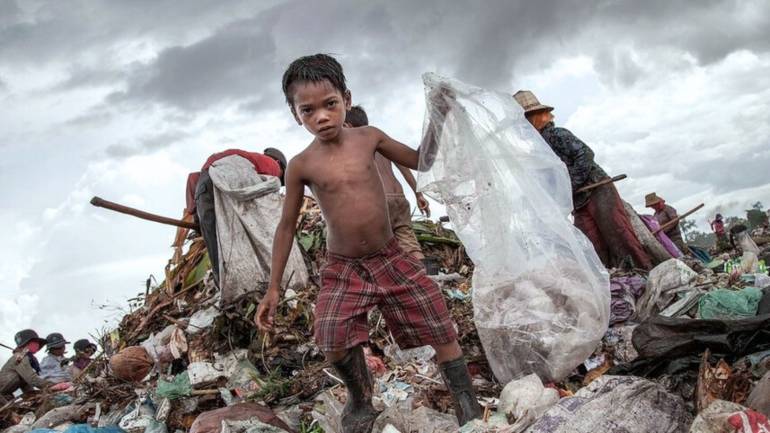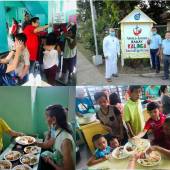Child Labor

The Philippine Department of Child Labor, in its 2023 report, says there were 1.37 million working children, pointing to the agriculture sector as the top industry with the most child labourers and tagging Northern Mindanao as the region with the highest child labour incidence.
Countless kids go to work every single day, rainy or sunny, mostly in unhealthy working conditions. Luisa, Juan, and Pedro, are you old enough to work? So what if 12-year-old kids are allowed to work in Egypt and Senegal for seasonal work and in Benin for light agriculture, and 13-year-olds are allowed to work in Denmark as shop assistants, in Tunisia, and in Switzerland for light non-industrial labour? What does it matter if a 14-year-old is legally able to work in construction in Cyprus, street trades in India and Sri Lanka, and mining in the Dominican Republic and Thailand as a 15-year-old? They are just kids. They’re supposed to be playing with dolls, learning math and biology, frolicking in a stream’s shallow water, or climbing trees with friends.
In the Philippines, the employment of children under the age of 15 is both illegal and unethical, courtesy of RA 7610 and RA 7658. The State did its duty, and the law (what is legal) affirms what is moral. As expected, since 1992, Shell Philippines, Caltex, Total, and Petron have ceased hiring hundreds of kids as gasoline boys and promised to eradicate the disgraceful phenomenon in the oil business. That, for me, really matters a lot. However, doubting Thomases persist in asking—and with a valid reason, of course—how does the Department of Labor and Employment (DOLE ) enforce this law in favour of little Boyet, Isagani, and Cristina when DOLE cannot even enforce the law for employers to remit SSS and pay correct wages and other benefits?
The law against child labour is so fundamental in any civil society
Did we just launch the Philippine Program Against Child Labor 2017–2022, which aimed to rescue one million Filipino children from child labour? Little Mario, Abigail, and Joel raised their hands into the air to celebrate. But what happened after the speeches and rhetoric—and after the world-class band left? If the Philippines is a worthy signatory to the United Nations Convention on the Rights of the Child, how come, with enough laws against child labour, the most shameful forms are still being done under our noses?
“The State shall provide special protection to children from all forms of abuse, neglect, cruelty, exploitation, discrimination, and other conditions prejudicial to their development, including child labour and its worst forms.”
Does ILO Convention No. 182 clearly define the evils of child labour and finger-point small-scale mining as the deadliest forms of employment? Yet, in small-scale mines in our far-flung mountains, the daily survival acts of Toto, Joel, and Dante carrying heavy sacks of rocks, fetching clean water, and loading the thick logs used to support the underground tunnels create the dirtiest landscape of actual poverty. Shame on us. The Filipino kids, as young as 9 or 10 years old, are still working. To withstand 16 hours of work in the mining pits, several kids receive a daily dosage of cheap performance-enhancing drugs. Related research-based fact-finding narratives are easily accessible and available on YouTube and Google. Shame on us!
Why do millions of our kids continue to work in the new millennium, completely stop going to school, and are unable to escape from this vicious cycle? Why do over a million Filipino children still take on hazardous work, repeatedly exposed to extreme weather, poor working conditions, and long working hours while using substandard tools and crude equipment, or, for those working in sh---t-hole chemical factories, using their bare hands without gloves and face masks? Shame on us! Our little girls stop playing with dolls and instead offer themselves for (or forced into) prostitution, pornography, or lewd performances—with their parents or kin as pimps!
Meet little Laura, Clara, and Diego, who live in extreme poverty. “Mahirap po ang tatay at nanay ko." My parents are poor, and so the kids are forced to work to supplement the family’s meagre income. In urban centres, the phenomena of street children and child labour are the twin offspring of lady poverty. The most pressing act of the day is for parents and kids to earn a living to make ends meet. All other things are secondary. Even the lowest payments in cash or kind are a welcome relief to the poverty-stricken families where these little Gigi, Boy, and Lorenzo belonged. Regrettably, the poor parents of David, Nelson, and Juana believe that the kids must help to pay debts and support the family. So, they are “sacrificed at the altar of bread-winning” at a tender age as Kiko, Jun, and Maria send smaller siblings to school while they ironically stay out of school.
We walk down our common memory lane and remember the unhappy story of the teenager SARAH BALABAGAN when parents Bai and Karim Balabagan allowed their adolescent daughter Sarah to work as a domestic helper in the United Arab Emirates. At the tender age of 14, Sarah was already the breadwinner in the family. Sarah suffered in jail from 1994–1996 after stabbing and killing her elderly employer, who tried to rape her. During the height of her ordeal, the father expressed this low-life wish (I couldn’t believe it) that Sarah be freed so she could earn for the family again.
Is it a paradox of poverty or a mockery of our national pride? According to the 2018 End of Childhood Index, Filipino kids were the least and the last when it came to welfare and development. When business profit was up but kids were down, shouldn’t I ask what kind of national policy we are in? In 2018, reports indicated a bullish Philippine economy, yet a multitude of Filipino children were bullied while working in the adult world.
Filipino kid, still working? It’s not your fault, of course, but I need to tell you that your angel in Heaven covers her face in utter shame as the devil’s laughter is heard everywhere in Hell. Dear Filipino parents and employers, the kids are physically deteriorating, mentally wasting, morally decaying, and lowly aspiring. Don’t even bother to inquire whether or not little Omar, Kim, and Shiela have the same human dignity as adults and are endowed with basic human rights. They have! Dear Filipino bosses, remember that child labour is not only a crime but also an immoral act. Child labour not only commits a crime against the nobility of humankind but also an immoral act against YHWH God, who forewarned you not to despise His little ones.
Radio Veritas Asia (RVA), a media platform of the Catholic Church, aims to share Christ. RVA started in 1969 as a continental Catholic radio station to serve Asian countries in their respective local language, thus earning the tag “the Voice of Asian Christianity.” Responding to the emerging context, RVA embraced media platforms to connect with the global Asian audience via its 21 language websites and various social media platforms.














